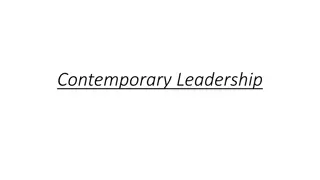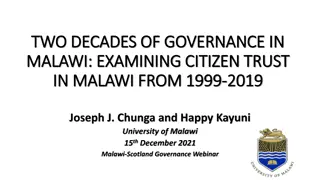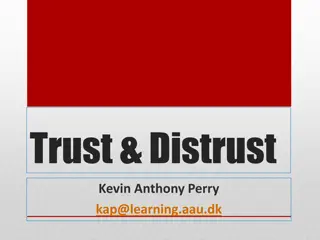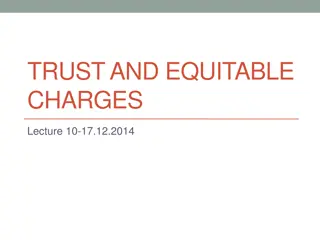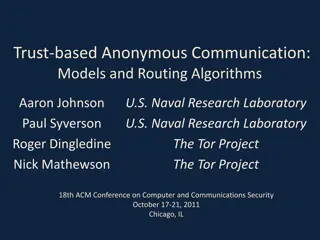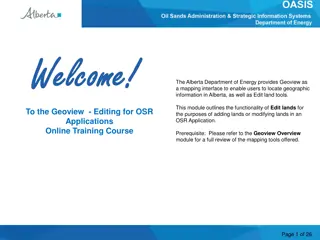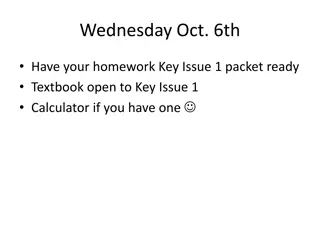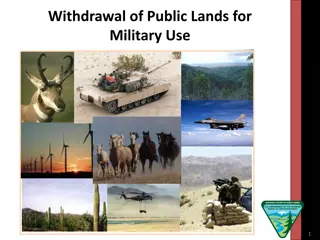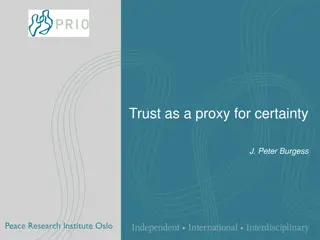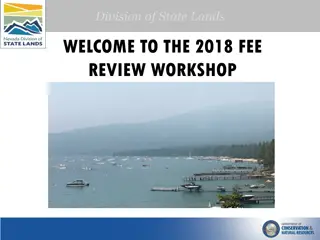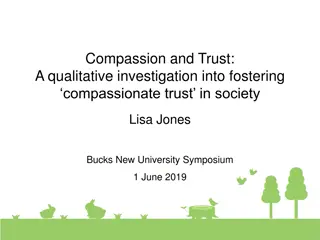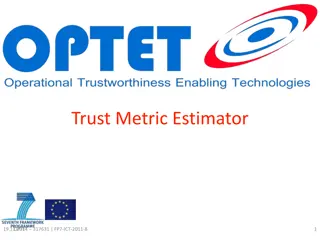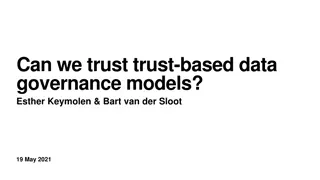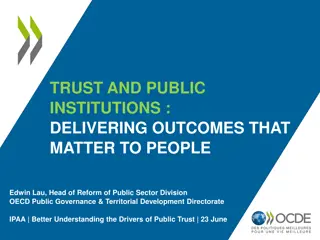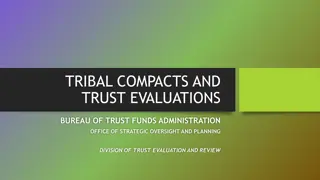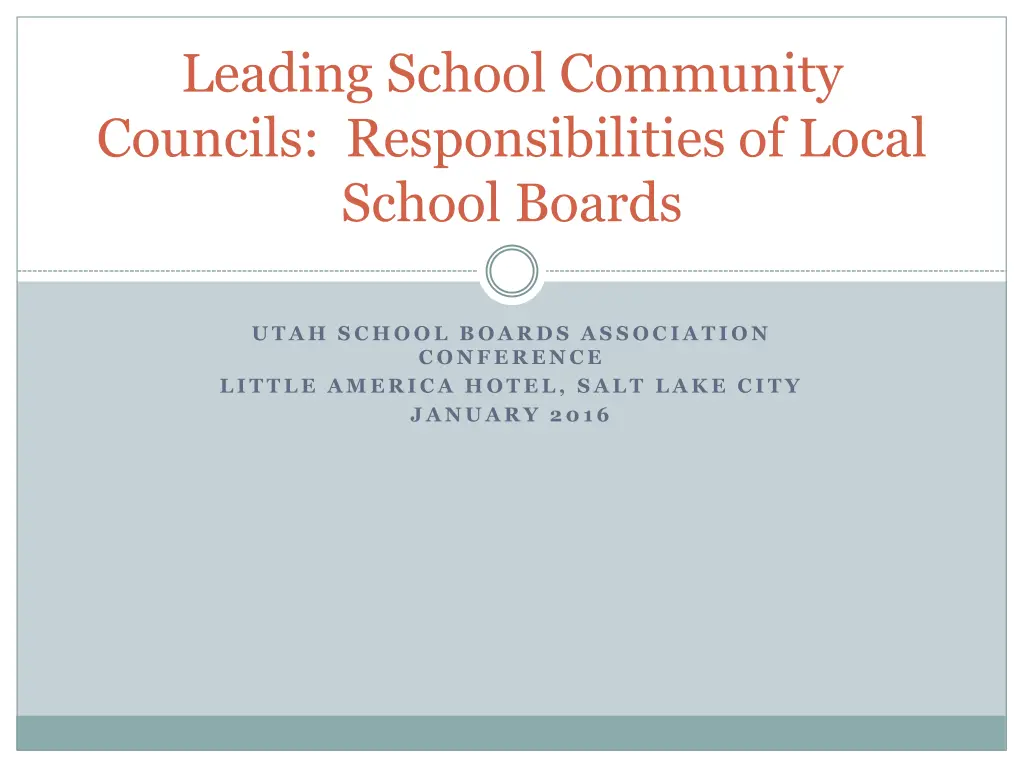
Local School Board Responsibilities and Utah State Funding Overview
Explore the unique funding system of the School LAND Trust in Utah, driven by local school community councils and approved by local school boards. Learn about the critical responsibilities, training requirements for board presidents, and the historical background of state-federal agreements affecting education in Utah.
Download Presentation

Please find below an Image/Link to download the presentation.
The content on the website is provided AS IS for your information and personal use only. It may not be sold, licensed, or shared on other websites without obtaining consent from the author. If you encounter any issues during the download, it is possible that the publisher has removed the file from their server.
You are allowed to download the files provided on this website for personal or commercial use, subject to the condition that they are used lawfully. All files are the property of their respective owners.
The content on the website is provided AS IS for your information and personal use only. It may not be sold, licensed, or shared on other websites without obtaining consent from the author.
E N D
Presentation Transcript
Leading School Community Councils: Responsibilities of Local School Boards UTAH SCHOOL BOARDS ASSOCIATION CONFERENCE LITTLE AMERICA HOTEL, SALT LAKE CITY JANUARY 2016
Local Board Responsibilities The School LAND Trust Funding is very unique in that it is the only state funding where the use is driven by the local school community council and solely approved by the local school board. It is imperative that responsibility to review and approve the plans for funding be taken very seriously by the local school board. If plans are approved that do not meet the criteria set forth by the legislation and rule, it falls back on the local board to answer for their actions. USOE School Children s Trust Section
Board Presidents Role Utah State Code: 53A-16-101.5 (10) The president or chair of a local school board or charter school governing board shall ensure that the members of the local school board or charter school governing board are provided with annual training on the requirements of this section.
HISTORY & PURPOSE Statehood Deal State agrees not to tax federal domain Federal government grants land to state for support of free, public, nonsectarian schools Utah Enabling Act Law passed by Congress offering entrance into the Union Contains terms and promises of both parties Confirmed by Utah in its Constitution
HISTORY & PURPOSE 4 Types of Land Private Federal State Trust - held in perpetuity for the school children of Utah
School in Every Township Section 16 Ohio (1803) Minnesota (1858) The Arid West Sections 16 and 36 Oregon (1859) Wyoming (1890)) The Really Arid West Sections 2, 16, 32 & 36 Utah, Arizona and New Mexico
Currently: 3.4 million surface acres of Trust Land in Utah. Approximately the size of Connecticut Lands Earn Revenue From: Minerals Surface Development Grazing Forestry
SITFO SITLA Invests Trust Fund Manages Trust Land School Children s Trust Office Allocates Trust Funds SCCs (w/approval from local boards) Plans for local academic achievement Permanent School Fund TAC (Trust Action Committee) Utah PTA UASCC (Utah Association School Community Councils)
Funding Flow Chart Revenues Generated From Activities on School Trust Lands Interest Trust Land Management Expenses Permanent State School Fund Dividends $ for Utah Schools Capital Gains Reinvested
History & Purpose Growth in Permanent Fund June 30, 1987 Balance: 2015 Balance: $ 15,271,659 over $2,000,000,000
$10,000,000,000 $1,000,000,000 $100,000,000 $10,000,000 $1,000,000 $100,000 11/30/10 11/30/13 11/30/16 11/30/19 6/30/31 6/30/61 6/30/91 6/30/25 6/30/28 6/30/34 6/30/37 6/30/40 6/30/43 6/30/46 6/30/49 6/30/52 6/30/55 6/30/58 6/30/64 6/30/67 6/30/70 6/30/73 6/30/76 6/30/79 6/30/82 6/30/85 6/30/88 6/30/94 6/30/97 6/30/00 6/30/03 6/30/06 6/30/09 12/31/01 12/31/04 11/30/07 11/30/22 6/30/12 12/31/1898 Growth in Permanent Fund (log scale) Without the dip in 1982, the fund would be roughly at $10-15 billion today
DISTRICT LAND TRUST DISTRIBUTION DISTRICT LAND TRUST DISTRIBUTION Alpine 4, 957,407 Granite 4,545,383 Beaver 199,513 Iron 679,014 Box Elder 838,345 Jordan 3,503,856 Cache 1,181,184 Juab 252,469 Canyons 2,313,184 Kane 178,291 Carbon 322, 246 Logan 491,826 Daggett 111,339 Millard 287,292 Davis 4,642,558 Morgan 281,642 Duchesne 439,592 Murray 521,393 Emery 249,776 Nebo 2,162,592 Garfield 160,748 N Sanpete 256,509 Grand 195,571 N Summit 165,873
DISTRICT LAND TRUST DISTRIBUTION DISTRICT LAND TRUST DISTRIBUTION Park City 411,274 Uintah 619,750 Wasatch 487,973 Piute 118,760 Washington 1,881,645 Provo 1,190,579 Wayne 131, 576 Rich 130,693 Weber 2, 149,057 Salt Lake 1,651,487 San Juan 298,462 Sevier 402,733 Estimated Average: Elementary = Middle = High = $45,000 $60,000 $72,000 S Sanpete 306,215 S Summit 199,119 $45.8 Million Tintic 116,924 Tooele 1,011,407
This amount is approximately 2% WPU We fight each year for WPU. Should we be fighting for this funding?
HISTORY & PURPOSE End result is you (local school board members) are the adjudicator and protector of these funds that are intended to benefit the public school children of Utah in perpetuity. HOW?
Five Key Local Board Responsibilities Training provided for all School Community Council members and local Board of Ed members Read and approve School Improvement/Trust Land plan Assure compliance with state law and board rules Provide information & data to SCCs so they may complete work Annual report to councils related to Digital Citizenship Disbursement of funds to schools for adherence to LAND Trust Plan 1. 2. 3. 4. 5. 6.
Training Local Boards assure that training is provided for all SCC members Training must occur before school plans can be approved and the date of training(s) for boards and SCC members must be provided annually to the USOE prior to plans being approved.
The Work of SCCs School Improvement Plan Reading achievement plan (elementary schools) Professional Development LAND Trust Plan Digital Citizenship review
Plan Approval Local Boards are Approving Entities As of January 2016, Trust Lands plans will come to the local boards first for their approval. Read and approve plans or return plans to SCC for amendment and resubmission before May 15th This approval process is putting local boards in the lead position; the board responsibility has been added to the MBA program at USBA
Plan Approval SCC Expenditures Should be used for data-driven and evidence-based practices and services Local boards and districts may not require a council to spend SCC funds on a specific use or set of uses An SCC council may spend no more than $5000 or 20% of the school s annual allocation for: Civic and character education, Digital citizenship training
Plan Approval The local board should make sure that the money is being spent to meet critical academic needs, and that it directly impacts the instruction of students and improves academic excellence.
Plan Approval Amend not a 4 letter word Most important question, Has your SCC reviewed this amendment? Signature forms Principal may choose a digital signature form or a printed form that is physically signed and uploaded. If the hard copy version is chosen, the school or district may create their own or use a downloadable version. Your Board of Education can choose to set which version they prefer, if desired Final reports
Compliance Always updated on school website: 1. Council Members names and contact info (constantly updated) 2. Meeting schedule for the year 3. Report to parents on how LAND Trust funds were used in prior year and what they achieved 4. Approved minutes from last 3 years 5. Rules of Order & Procedure and/or Bylaws 6. Dollar amounts received each year 7. Opportunities for parents to serve on SCC and how they can directly influence the expenditure of funds
Compliance Update website at least 1 week prior to meeting 1. Current meeting agenda 2. Notice of meeting: time, place and date of meeting 3. Draft minutes from previous meeting
Compliance Minutes The State will use minutes to verify things are properly discussed, on agenda, voted on and so should local boards All votes should be documented in minutes Any budget decisions should be in minutes Any amendments should be in minutes Attendees, absences, and who votes/how
District Staff Assistance Develop and implement training of SCCs Preview plans, amendments, & final reports. Work with SCCs to get them prepared for Board review Develop and assure signatures pages are signed Provide SCCs with data and information needed to develop strong academic plans Provide online assurance that SCC members and local board have received training Compliance reviews
District Staff Assistance Disbursement of funds will generally be done by the Business Manager to schools with approved plans Reallocation of the annual distribution taking into account boundary changes so the funds follow the students Reallocation of estimated distribution given the districts best guess about where students will be in the coming year.
Suggested Best Practices 2nd Review of the year by the Board of Education: Final Report: Were expenditures consistent with those outlined in the plan? Did the outlined measurements produce success? Train SCCs to review LAND Trust Plan budget throughout the year and make sure the money is being spent accurately according to the plan Review current year, not just focus on the next year s plan Develop a Board rubric to use for plan approvals
Suggested Best Practices Board examine where SCC money is being spent if it is something that is global and consistent, you may want to consider whether that is something you should be covering in your budget Visit SCCs in your Board area each year Encourage SCCs to give input on Board study items
FUTURE Increased local board governance happening now Upcoming Legislation Constitutional amendment to change Distribution practices Proposed changes to language during 2016 session
4TH ANNUAL CONFERENCE & TRAINING Thursday, January 14th 3:45 8 p.m. Lehi High School 180 N. 500 East Lehi Register Online at: http://tinyurl.com/UASCC2016
Susan Edwards susan.edwards@canyonsdistrict.org (801)856-3712
Utah School Childrens Trust Section timothy.donaldson@schools.utah.gov paula.plant@schools.utah.gov karen.rupp@schools.utah.gov natalie.gordon@schools.utah.gov http://www.schoollandtrust.org/ (801)538-7555


